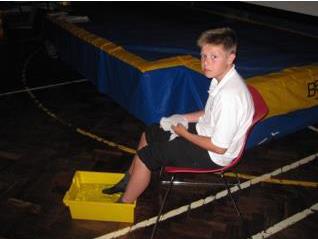To remember the centenary of World War One, the Heritage Lottery Fund encouraged groups to devise modules of work to educate sections of the local community.
At the local Kirkburton Middle School, pupils in Year 8 studied the First World War for one of their National Curriculum Programmes of Study in History. In May 2016, two qualified teachers, one a member of the Kirkburton History Group, delivered a Drama Workshop to almost two hundred 13 year old boys and girls of mixed abilities.
The Broad Aims and Objectives
This was to find out what the village of Kirkburton was like 100 years ago and to appreciate how the residents, or people connected to the village, were affected by World War One.
The Format
The pupils began by comparing the village past and present through discussion and by studying a collection of photos from 100 years ago. They were then introduced to six people from these years, three men and three women. They found out about their differing life experiences in the period 1914 to 1919.
The women were Frances Shaw, who ran the Rose and Crown Public House with her husband; Margaret Ann Gwyer, who married a former Curate of Kirkburton Church before he transferred to Canada, and Nursing Matron Gertrude Inglis, originally from Inverness.
The men were Herbert and Frank Shaw, the sons of Frances, and their cousin and neighbour, George Charlesworth.
The war was studied year by year and the work was made as active as possible. For instance, the pupils stamped their feet in unison to represent the sound of troops marching to war.
Some pupils from each class put on woollen socks and sat with their feet in bowls of freezing water to imagine what it was like in the cold, muddy trenches.


The next stage was physical theatre whereby groups of pupils worked on the following tableaux:
- Soldiers training and preparing to go on marching duty
- Life in the trenches
- A war hospital scene
The pupils then performed their tableaux and discussed the outcomes. Finally, they found out what happened to the six people they had been introduced to.


Outcomes
Sadly, Frances Shaw lost her nephew, George Charlesworth on 30 September 1917 aged 24. He was buried in Belgium.
Frances was very anxious as both her sons were also conscripted to serve in the war. Shortly after his 18th birthday, Frank Shaw left the village to train at Rugeley Military Camp where he contracted influenza and died on 10th April 1918. Her son, Herbert Shaw, fought in the war and survived.
Both Margaret Ann Gwyer and her husband survived a submarine attack on the passenger ship, Lusitania. She was sucked down the ship’s funnel, badly burned and amazingly was blown out into the sea. She was luckily rescued by a passing lifeboat and eventually reunited with her husband. The couple returned to Huddersfield where they continued to do humanitarian work, initially at Royds Hall Military Hospital.
Nurse Inglis, the oldest of the people studied, was working as the Paris Nurse before the Kirkburton Auxiliary Hospital was commissioned and was chosen to act as the Matron. She continued her nursing duties as Parish Nurse in the village long after the war ended.
The pupils finally filled in an evaluation sheet to record their experiences. A quote from one of the evaluations encapsulates the results:
“I really enjoyed learning about how the war affected people in our village and the drama activities enabled me to experience some of the hardships, such as life in trenches. “
Permission to use the photographs taken during the workshops was given by Kirkburton Middle School.
